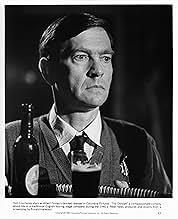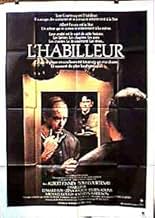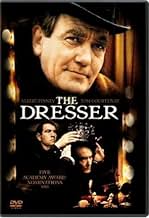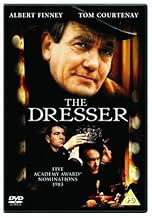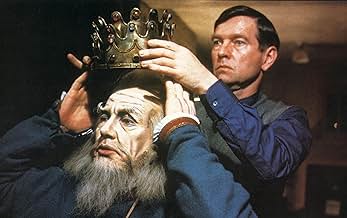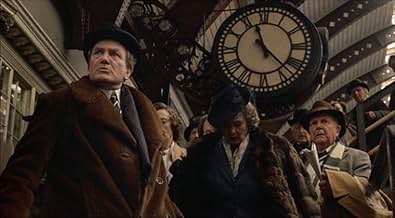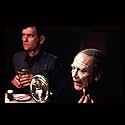Ajouter une intrigue dans votre languePersonal assistant Norman struggles to get deteriorating veteran actor Sir through a difficult performance of King Lear.Personal assistant Norman struggles to get deteriorating veteran actor Sir through a difficult performance of King Lear.Personal assistant Norman struggles to get deteriorating veteran actor Sir through a difficult performance of King Lear.
- Nommé pour 5 oscars
- 5 victoires et 17 nominations au total
Anne Blackman
- Beryl
- (as Anne Mannion)
Avis en vedette
I just watched The Dresser this evening, having only seen it once before, about a dozen years ago.
It's not a "big" movie, and doesn't try to make a big splash, but my God, the brilliance of the two leads leaves me just about speechless. Albert Finney and Tom Courtenay are nothing less than amazing in this movie.
The Dresser is the story of Sir, an aging Shakespearean actor (Finney), and his dresser Norman (Courtenay), sort of a valet, putting on a production of King Lear during the blitz of London in World War II. These are two men, each dependent upon the other: Sir is almost helpless without the aid of Norman to cajole, wheedle, and bully him into getting onstage for his 227th performance of Lear. And Norman lives his life vicariously through Sir; without Sir to need him, he is nothing, or thinks he is, anyway.
This is a character-driven film; the plot is secondary to the interaction of the characters, and as such, it requires actors of the highest caliber to bring it to life. Finney, only 47 years old, is completely believable as a very old, very sick, petulant, bullying, but brilliant stage actor. He hisses and fumes at his fellow actors even when they're taking their bows! And Courtenay is no less convincing as the mincing dresser, who must sometimes act more as a mother than as a valet to his elderly employer. Employer is really the wrong term to use, though. For although, technically their relationship is that of employer and employee, most of the time Sir and Norman act like nothing so much as an old married couple.
Yes, there are others in the cast of this movie, but there is no question that the true stars are Finney, Courtenay, and the marvelous script by Ronald Harwood. That is not to say that there aren't other fine performances, most notably Eileen Atkins as the long-suffering stage manager Madge. There is a wonderful scene where Sir and Madge talk about old desires, old regrets, and what might have been.
Although it doesn't get talked about these days, it is worth remembering that The Dresser was nominated for five Academy Awards: Best Actor nominations for both Finney and Courtenay, Best Picture, Best Director (Peter Yates), and Best Adapted Screenplay.
I had remembered this as being a good movie, but I wasn't prepared to be as completely mesmerized as I was from beginning to end. If you want to see an example of what great acting is all about, and be hugely entertained all the while, then I encourage you to see The Dresser.
It's not a "big" movie, and doesn't try to make a big splash, but my God, the brilliance of the two leads leaves me just about speechless. Albert Finney and Tom Courtenay are nothing less than amazing in this movie.
The Dresser is the story of Sir, an aging Shakespearean actor (Finney), and his dresser Norman (Courtenay), sort of a valet, putting on a production of King Lear during the blitz of London in World War II. These are two men, each dependent upon the other: Sir is almost helpless without the aid of Norman to cajole, wheedle, and bully him into getting onstage for his 227th performance of Lear. And Norman lives his life vicariously through Sir; without Sir to need him, he is nothing, or thinks he is, anyway.
This is a character-driven film; the plot is secondary to the interaction of the characters, and as such, it requires actors of the highest caliber to bring it to life. Finney, only 47 years old, is completely believable as a very old, very sick, petulant, bullying, but brilliant stage actor. He hisses and fumes at his fellow actors even when they're taking their bows! And Courtenay is no less convincing as the mincing dresser, who must sometimes act more as a mother than as a valet to his elderly employer. Employer is really the wrong term to use, though. For although, technically their relationship is that of employer and employee, most of the time Sir and Norman act like nothing so much as an old married couple.
Yes, there are others in the cast of this movie, but there is no question that the true stars are Finney, Courtenay, and the marvelous script by Ronald Harwood. That is not to say that there aren't other fine performances, most notably Eileen Atkins as the long-suffering stage manager Madge. There is a wonderful scene where Sir and Madge talk about old desires, old regrets, and what might have been.
Although it doesn't get talked about these days, it is worth remembering that The Dresser was nominated for five Academy Awards: Best Actor nominations for both Finney and Courtenay, Best Picture, Best Director (Peter Yates), and Best Adapted Screenplay.
I had remembered this as being a good movie, but I wasn't prepared to be as completely mesmerized as I was from beginning to end. If you want to see an example of what great acting is all about, and be hugely entertained all the while, then I encourage you to see The Dresser.
This is a movie that deserves another look--if you haven't seen it for a while, or a first look--if you were too young when it came out (1983). Based on a play by the same name, it is the story of an older actor who heads a touring Shakespearean repertory company in England during World War II. It deals with his stress of trying to perform a Shakespeare each night while facing problems such as bombed theaters and a company made up of older or physically handicapped actors--the young, able bodied ones being taken for military service. It also deals with his relationship with various members of his company, especially with his dresser. So far it all sounds rather dull but nothing could be further from the truth. While tragic overall, the story is told with a lot of humor and emotions run high throughout. The two male leads both received Oscar nominations for best actor and deservedly so. I strongly recommend this movie to anyone who enjoys human drama, theater--especially Shakespeare, or who has ever worked backstage in any capacity. The backstage goings-on make up another facet of the movie that will be fascinating to most viewers.
Albert Finney and Tom Courtenay are brilliant as Sir and his Dresser. Of course the play is brilliant to begin with and nothing can compare with the immediacy and collegiality of theatre, and I think you listen better in theatre; but on the screen we become more intimate, we're 'up-close' more than we are in the theatre, we witness subtle changes in expression, we "see" better as well as listen. Both the play and the movie are wondrous: moving, intelligent, illuminating--of the backstage story of the company, of historical context, of the two main characters, and of the parallel characters in "Lear" itself. If you cannot get to see it in a theatre (I don't imagine it's produced much these days) then, please, do yourself a favor, and get the video.
A fantastic cinema experience. I really enjoyed seeing this truly magnificent film in the theater when it came out. There is nothing to add, except that is a terrible shame that sir Albert Finney still isn't accepted by the AMPAS (American Academy). After roles in such films as Tom Jones, Murder on the Orient Express, Under the Volcano (to name only few - for these he was nominated for the Oscar), The Dresser is arguably his highlight, yet...
I know, Oscars are just a popularity contest, but if Americans like British actors and actresses ("and the Oscar goes to" Jeremy Irons, Daniel Day-Lewis, Anthony Hopkins, Emma Thompson, Glenda Jackson etc. - and they all deserved the award!), why they always left Sir Finney with empty hands?
On the other hand, they gave it to John Wayne and Marisa Tomei (in My Cousin Vinny). I don't know, should I laugh or cry?
If you have seen the two leads in The Dresser you won't forget what is the art of acting. Watch this film and enjoy! I recommend it to everyone who loves art.
I give 9/10 for this excellent film (1 point missing for non-cinematic material, after all it is "just" a filmed stage play).
Note: My rating criteria is much stricter than the one on IMDb (10 only for the Cinematic masterpiece that should/could last forever).
I know, Oscars are just a popularity contest, but if Americans like British actors and actresses ("and the Oscar goes to" Jeremy Irons, Daniel Day-Lewis, Anthony Hopkins, Emma Thompson, Glenda Jackson etc. - and they all deserved the award!), why they always left Sir Finney with empty hands?
On the other hand, they gave it to John Wayne and Marisa Tomei (in My Cousin Vinny). I don't know, should I laugh or cry?
If you have seen the two leads in The Dresser you won't forget what is the art of acting. Watch this film and enjoy! I recommend it to everyone who loves art.
I give 9/10 for this excellent film (1 point missing for non-cinematic material, after all it is "just" a filmed stage play).
Note: My rating criteria is much stricter than the one on IMDb (10 only for the Cinematic masterpiece that should/could last forever).
Adapted by a 1981 Broadway sensation, its film counterpart is a hidden treasure of its time (although it achieved 5 nominations in the Oscar including BEST PICTURE, BEST DIRECTOR, BEST ACTORX2 and BEST ADAPTED SCREENPLAY) but has been rarely mentioned and seen by a younger generation, I have no idea of its existence until recently. I feel kind of cherished to have a chance to watch this UK production since the play-in-a-play structure generally is my cup of tea.
Then it proves that this is an exceedingly diverting film from the late director Peter Yates even though the quintessence of pleasure may lie in Finney and Courtenay's crack two-hander, which is beyond any thespian methods, two utterly gallant performances brilliantly deliver every tiny little nuance and never descend into a stasis of tedious affectation. Theatrical adaption has always been an impeccable showcase for actors. A copybook triumph from both Finney and Courtney. The King Lear play in the film proffers a tour-de-force stage for Finney's expertise and his overpowering sway is both intimidating and entertaining; as for Courtenay, whose character molding even merits more pluck due to the self-challenging devoutness. Which one I prefer, after some contemplative thinking, despite of Finney's pretty fierce endeavor, I will choose Courtenay, a lesser known actor but achieves a more startling reverberation.
Among the supporting roles, Eileen Atkins is managing to steal some flare from two leading players, she is so underrated and should be ranked alongside Maggie Smith, Judi Dench and Helen Mirren, among the most venerated names inside the so-called UK Dame coterie.
The film has set up a perfect mode for the contemporary play-goes-film trend, within some minimal usage of settings, the impact has been magnified in an index level to be seen by a much larger audience. The screenplay is the keystone here, that's why they're emerging in an inexhaustible tide which verifies that theatrical play is an endless fodder-provider for both awards-craving production companies and thespians.
Then it proves that this is an exceedingly diverting film from the late director Peter Yates even though the quintessence of pleasure may lie in Finney and Courtenay's crack two-hander, which is beyond any thespian methods, two utterly gallant performances brilliantly deliver every tiny little nuance and never descend into a stasis of tedious affectation. Theatrical adaption has always been an impeccable showcase for actors. A copybook triumph from both Finney and Courtney. The King Lear play in the film proffers a tour-de-force stage for Finney's expertise and his overpowering sway is both intimidating and entertaining; as for Courtenay, whose character molding even merits more pluck due to the self-challenging devoutness. Which one I prefer, after some contemplative thinking, despite of Finney's pretty fierce endeavor, I will choose Courtenay, a lesser known actor but achieves a more startling reverberation.
Among the supporting roles, Eileen Atkins is managing to steal some flare from two leading players, she is so underrated and should be ranked alongside Maggie Smith, Judi Dench and Helen Mirren, among the most venerated names inside the so-called UK Dame coterie.
The film has set up a perfect mode for the contemporary play-goes-film trend, within some minimal usage of settings, the impact has been magnified in an index level to be seen by a much larger audience. The screenplay is the keystone here, that's why they're emerging in an inexhaustible tide which verifies that theatrical play is an endless fodder-provider for both awards-craving production companies and thespians.
Le saviez-vous
- AnecdotesRonald Harwood based his play "The Dresser", and this movie's subsequent screenplay, on the biography "Sir Donald Wolfit CBE: His life and work in the Unfashionable Theatre", and on his own experiences as an actor and dresser for renowned Shakespearian actor Donald Wolfit. Harwood's repertory ensemble, Shakespeare Company, frequently performed Shakespeare's plays, and Harwood was Wolfit's dresser between 1953 and 1958.
- GaffesAfter Sir and Norman leave the marketplace, they're passed by a Routemaster bus. These buses were first used in London in 1954, and weren't used outside London until the 1970's.
- ConnexionsEdited into The Clock (2010)
- Bandes originales(We're Going To Hang Out) The Washing the Siegfried Line
(uncredited)
Music by Michael Carr
Lyrics by Jimmy Kennedy
Sung by Tom Courtenay (as Norman)
Meilleurs choix
Connectez-vous pour évaluer et surveiller les recommandations personnalisées
- How long is The Dresser?Propulsé par Alexa
Détails
Box-office
- Budget
- 1 456 000 £ (estimation)
- Brut – États-Unis et Canada
- 5 310 748 $ US
- Brut – à l'échelle mondiale
- 5 310 748 $ US
Contribuer à cette page
Suggérer une modification ou ajouter du contenu manquant


